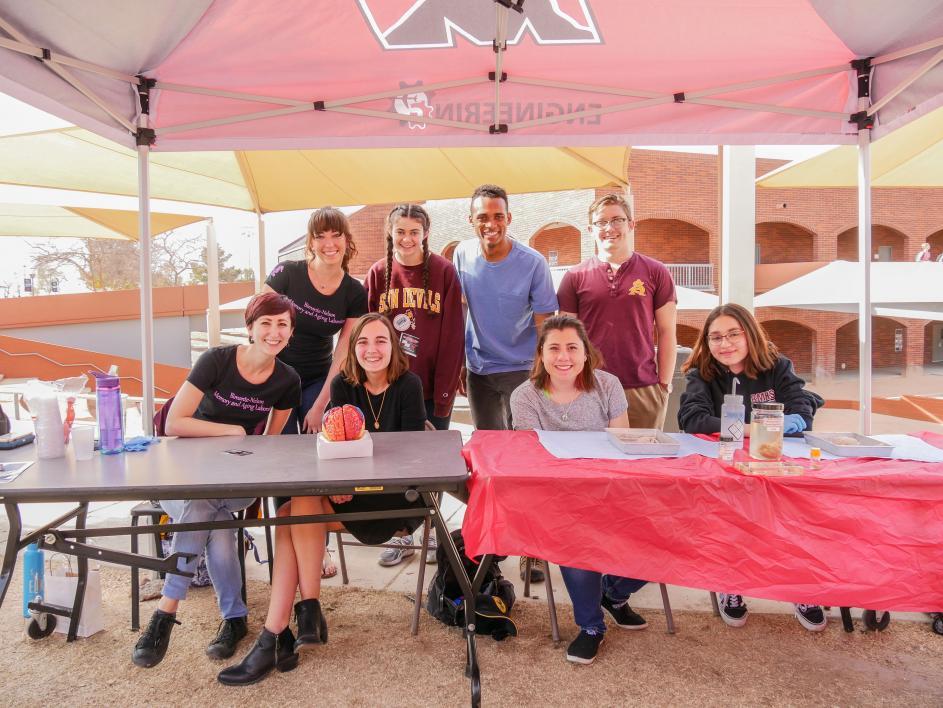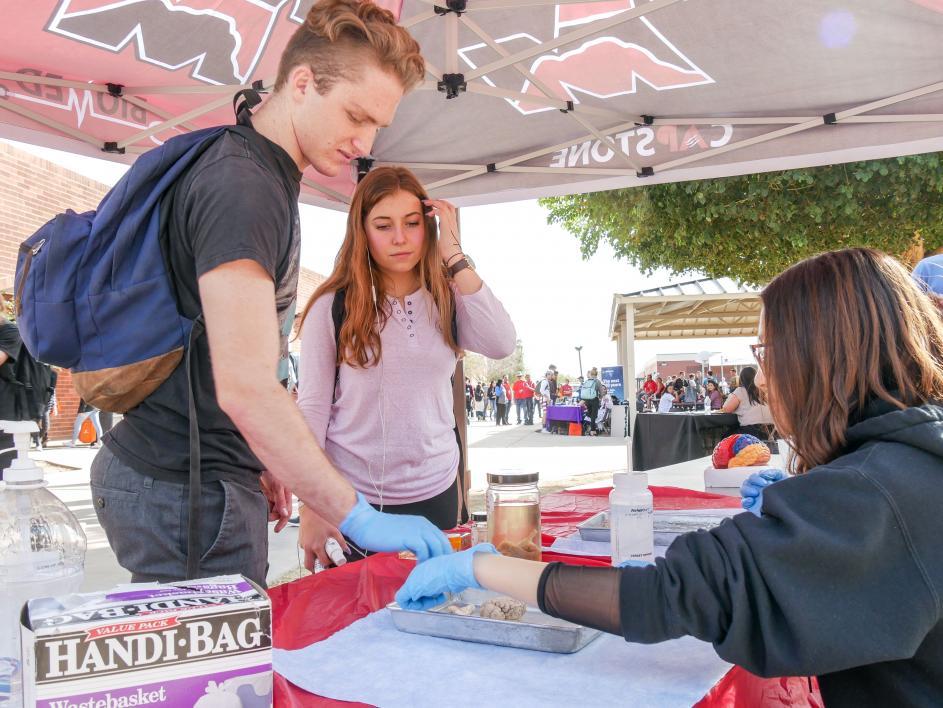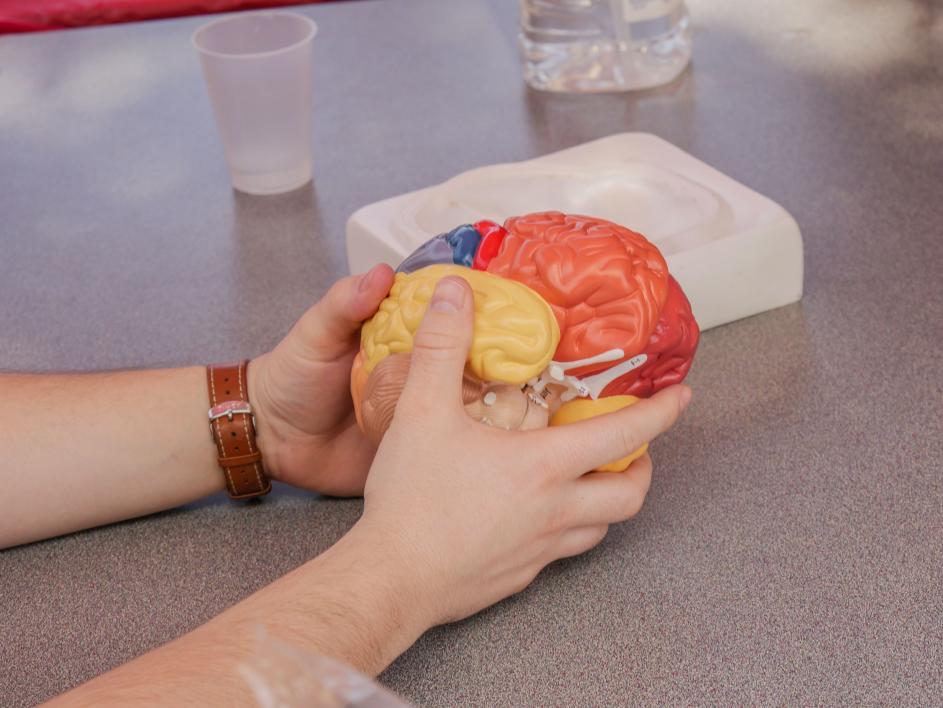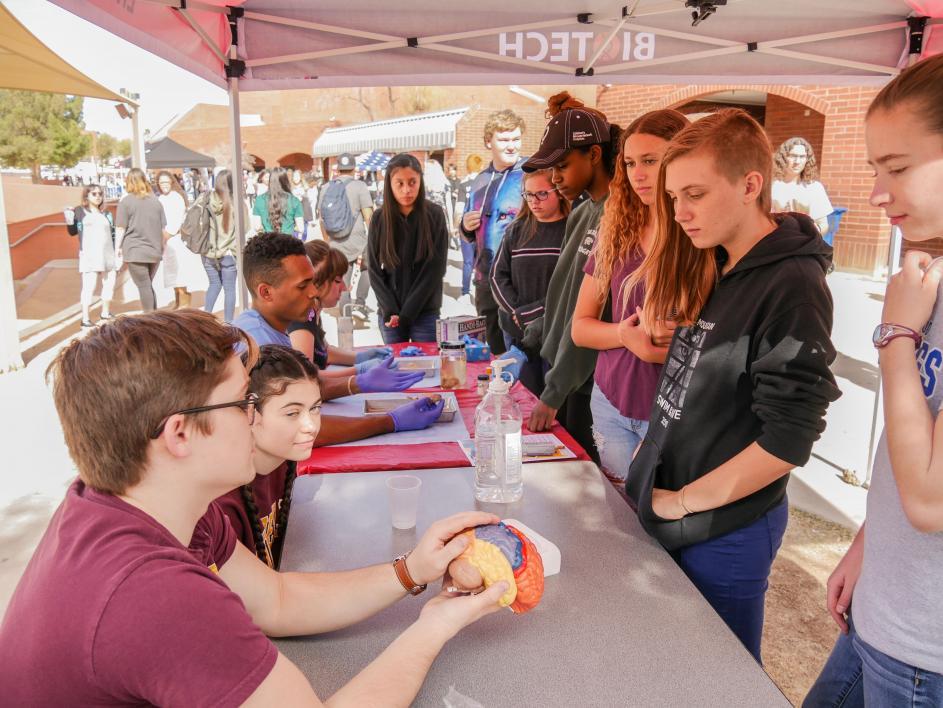ASU, Red Mountain High School partner to teach students about psychology, neuroscience

Isabel Strouse, a junior in ASU's Department of Psychology, assists Red Mountain High School students at the annual Red Mountain High School STEM Day. Photo by: Robert Ewing
Screams of excitement and nervous laughter echo across a high school food court. A flock of students at Red Mountain High School in Mesa gathers around a pop-up tent and a chorus of “ewws” breaks out. The reason for this ruckus? Brains, brought to campus by scientists from Arizona State University’s Department of Psychology.
Six different brains were displayed across a table staffed by enthusiastic ASU undergraduate and graduate students who work in the lab of Heather Bimonte-Nelson, professor of psychology. The high school students were encouraged to put on protective gloves and explore what a sheep brain felt like, taking their first steps into the field of psychology and neuroscience.
This is the second year that the ASU Department of Psychology has participated in STEM Day at Red Mountain High School. Bimonte-Nelson’s students partner with the high school to bring behavioral neuroscience to high school students before they head off to college.
“It is very important to involve young minds in hands-on research in high school so they can gain experience and explore their interests early on,” said Stephanie Koebele, a graduate student with Bimonte-Nelson.
Koebele added that high school students can get a taste of what it is like to work in a real laboratory, which could jump-start their preparation for future careers in a STEM field.
“Often high school and early college students do not have a specific mentor to answer big questions,” Koebele said. “Involving high school students, especially young women and under-represented minorities, can make a huge impact on their career trajectories by providing the opportunity for one-on-one mentoring with the undergraduates, graduate students and PIs of laboratories at ASU.”
The STEM Day is not all Red Mountain High School does to expose students to STEM fields. The psychology department at ASU and Red Mountain High School have partnered to create the “RISE (Research Intensive Scientific Experience) in Psychology at ASU” initiative. Together, Bimonte-Nelson and Katy Gazda, the program director of the Biotechnology program at Red Mountain High School, have created the RISE program to work with high school students to identify their interests, match them with a professor and laboratory in the psychology department, and allow students to perform research. Students complete a senior capstone project, including a presentation of their data, while getting hands-on laboratory experience before starting college.
In the Bimonte-Nelson lab, the RISE student researchers have many tasks, but the most important ones are to score, process, and analyze behavioral data. These student researchers also learn about the scientific method, about experimental design, and how to use computer programs that support research. In addition, they assist the undergraduate and graduate student researchers with many “wet laboratory” tasks, like mixing liquids and preparing solutions used for biochemistry-involved behavioral experiments.
As part of the RISE program, Red Mountain High School senior Abby Mann conducts research in the Bimonte-Nelson lab.
“I’m really interested in the learning aspect of psychology — I come from a family of teachers — so it’s really cool to watch how things affect learning and memory,” said Abby Mann, who will attend Barrett, The Honor’s College at ASU next year.
Like Mann, fellow high school senior Maria Valenzuela Sanchez also works as a researcher in the Bimonte-Nelson lab.
“We tested whether a certain hormone affected memory in surgical menopause,” said Valenzuela, who will also attend ASU next year. “It was very exciting to see the results.”
Both Mann and Valenzuela Sanchez won gold prizes at the school science fair and will compete at the district level in the Mesa Public Schools Science and Engineering Fair.
Red Mountain High School is not the only place where the public can interact with the psychology department’s and Bimonte-Nelson lab’s outreach activities. Along with many other ASU research groups, the Bimonte-Nelson lab will participate in ASU Open Door and Brain Fair for Children.
ASU Open Door 2018
1–6 p.m. Saturday, Feb. 24
This year marks the fifth consecutive year that Bimonte-Nelson’s lab will participate in ASU Open Door. The lab will host the “Brain Investigation Station,” where the public can experience neuroscience on a hands-on level. It will be fun for the whole family.
RSVP for free tickets here: https://www.eventbrite.com/e/asu-open-door-2018-tempe-campus-tickets-37943519087.
Brain Fair for Children
Tuesday, Feb. 27
Since 2007, the psychology department and the Bimonte-Nelson Team have hosted the ASU Brain Fair for Children. ASU invites children who attend Title 1 elementary schools to visit campus, where they learn about the brain and what it is like to go to college. The ASU Brain Fair for Children is the first field trip for many of the students, who often come from underprivileged backgrounds.
This year, the Department of Psychology will host 75 third graders from Creighton Elementary School at the ASU Brain Fair for Children. There will be crafts and activities, including making neuron models from pipe cleaners and brain lobes from play dough. Children will have the chance to look into microscopes and make observations about what they see.
Of course, the real sheep brains that caused the high school students to excitedly scream and giggle will also be at the Brain Fair for Children. The brains are always a big hit with the kids.
“The brain fair makes a big impact on these children,” Koebele said. “It is an honor to have the opportunity to interact with them, get them excited about science, and empower them to think about being a scientist as an accessible and attainable goal.”
More Science and technology

ASU professor breeds new tomato variety, the 'Desert Dew'
In an era defined by climate volatility and resource scarcity, researchers are developing crops that can survive — and thrive —…

Science meets play: ASU researcher makes developmental science hands-on for families
On a Friday morning at the Edna Vihel Arts Center in Tempe, toddlers dip paint brushes into bright colors, decorating paper…

ASU water polo player defends the goal — and our data
Marie Rudasics is the last line of defense.Six players advance across the pool with a single objective in mind: making sure that…





